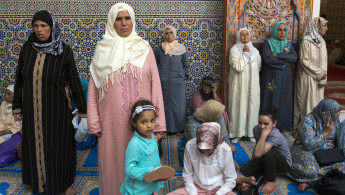Morocco introduces law to combat violence against women
A law to combat violence against women in Morocco entered into force on Wednesday, following years of heated debate and after thousands called for action in a recent gang-rape case.
For the first time women in Morocco have legal protection from "acts considered forms of harassment, aggression, sexual exploitation or ill treatment".
The new law also paves the way for victims of violence to be offered support.
Families minister Bassima Hakkaoui hailed the legislation as "one of the most important texts strengthening the national legal arsenal in the area of equality of the sexes," in an interview with the official MAP agency.
The text was first drafted five years ago and was adopted by parliament in February, following lengthy debate.
But the law has been deemed inadequate by some, with the former women's minister Nouzha Skalli arguing it fails to take into account "international definitions" of violence against women.
She has highlighted the example of marital rape, which is not criminalised under the new legislation.
In Morocco, media and rights groups regularly raise the alarm about endemic violence against women.
More than 40 percent of women said they had been "victims of an act of violence at least once", in a survey carried out by Morocco's High Commission for Planning which surveyed those living in towns and aged between 18 and 64.
The first woman to benefit from the legal change could be a 24-year-old who on Tuesday filed a complaint against three men for harassment, according to Moroccan media.
As authorities begin enforcing the law, a dozen suspects are being held over the alleged gang-rape of a teenage girl.
In a video posted online last month, 17-year-old Khadija Okkarou said she had been kidnapped, raped and tortured by a gang over a period of two months.
Okkarou's testimony triggered a petition signed by thousands of people urging King Mohammed VI to provide her with medical and psychological care.
The next hearing in the case is set for October 10.





 Follow the Middle East's top stories in English at The New Arab on Google News
Follow the Middle East's top stories in English at The New Arab on Google News


![22 Arab countries at COP29 have rejected the targeting of fossil fuels [Getty]](/sites/default/files/styles/image_330x185/public/2024-11/GettyImages-2184289638.jpg?h=199d8c1f&itok=ptHl5bec)